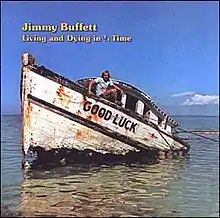Living and Dying in 3/4 Time
Living and Dying in ¾ Time is the fourth studio album by American popular-music singer and songwriter Jimmy Buffett and the second major-label album in Buffett's Don Gant-produced "Key West phase". It was initially released in February 1974 as Dunhill DS-50132[3] and later rereleased on Dunhill's successor labels ABC and MCA. It contains the song "Come Monday", his first top-40 hit single.
| Living and Dying in ¾ Time | ||||
|---|---|---|---|---|
 | ||||
| Studio album by | ||||
| Released | February 1974 | |||
| Recorded | October 1973 | |||
| Studio | Woodland Sound Studio, Nashville, Tennessee | |||
| Genre | ||||
| Length | 38:15 | |||
| Label | Dunhill 50132 | |||
| Producer | Don Gant | |||
| Jimmy Buffett chronology | ||||
| ||||
| Review scores | |
|---|---|
| Source | Rating |
| Allmusic | |
| Christgau's Record Guide | B–[2] |
Despite the title, not all the songs on the album are in 3
4 time signature. The lyrics of "Nautical Wheelers" on Buffett's subsequent album, A1A, refer to "living and dying in ¾ time" and the song is also in 3
4 time signature.
Chart performance
The album was Buffett's first to chart on the Billboard 200 album chart, but it only reached number 176. Unlike A White Sport Coat and a Pink Crustacean before it, it failed to make the Billboard Top Country Albums chart. The single of "Come Monday" reached number 30 on the Hot 100 and number three Easy Listening and number 58 Country. In addition, "Pencil Thin Mustache" hit number 44 Easy Listening and "Saxophones" "bubbled under" the Hot 100 at number 105.
Songs
In addition to "Come Monday," the album contains "Pencil Thin Mustache", another Buffett concert favorite. The two songs appear on most of his live albums and greatest hits compilations.
The album contains two cover songs: "Ballad of Spider John" written and originally performed by Willis Alan Ramsey and "God's Own Drunk" by Lord Buckley. Buffett's version of "Ballad of Spider John" is missing some of the lyrics of the original, although he has included these in concert renditions. "Livingston's Gone to Texas" is a remake of Buffett's own song that was originally recorded for High Cumberland Jubilee (recorded 1971, released 1976). The version on Living and Dying in ¾ Time is a slower tempo, more country-sounding presentation, and is missing the penultimate verse of the original.
Track listing
Side A:
- "Pencil Thin Mustache" (Jimmy Buffett) – 2:47
- "Come Monday" (Jimmy Buffett) – 3:06
- "Ringling, Ringling" (Jimmy Buffett) – 2:32
- "Brahma Fear" (Jimmy Buffett) – 4:05
- "Brand New Country Star" (V. Arnold, Jimmy Buffett) – 2:40
- "Livingston's Gone to Texas" (Jimmy Buffett) – 3:28
Side B:
- "The Wino and I Know" (Jimmy Buffett) – 3:00
- "West Nashville Grand Ballroom Gown" (Jimmy Buffett) – 2:34
- "Saxophones" (Jimmy Buffett) – 3:18
- "Ballad of Spider John" (Willis Alan Ramsey) – 4:26
- "God's Own Drunk" (Lord Buckley) – 6:19
Performers
The Second Coral Reefer Band:
- Jimmy Buffett – acoustic guitar
- Reggie Young – electric guitar
- Lanny Fiel – acoustic, electric, and slide guitar
- Doyle Gresham – pedal steel
- Tommy Cogbill – bass
- Mike Utley – keyboards
- Sammy Creason – drums and bodyguard
- Greg "Fingers" Taylor – harmonica
- Ferrell Morris – congas, vibes, and other little goodies
- Don Gant, Buzz Cason, Bergen White – background vocals
- Bergen White – string and horn arrangements
- Billy Puett – horns on "Saxophones"
Singles
- "Saxophones" with "Ringling Ringling" (released on Dunhill D-4378 in January 1974)
- "Come Monday" with "Wino And I Know" (released on Dunhill D-4385 in April 1974)
- "Pencil Thin Mustache" with "Brand New Country Star" (released on Dunhill D-15011 in August 1974)
The single release of "Saxophones" was different from the album version, with an added horn section and background vocal section.
References
- Living and Dying in 3/4 Time at AllMusic
- Christgau, Robert (1981). "Consumer Guide '70s: B". Christgau's Record Guide: Rock Albums of the Seventies. Ticknor & Fields. ISBN 089919026X. Retrieved February 22, 2019 – via robertchristgau.com.
- For unknown reasons, this album was issued with an out-of-sequence catalog number, lower than the one used on Buffett's previous LP and in sequence with Dunhill releases from 1972.